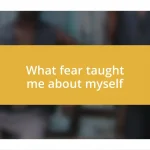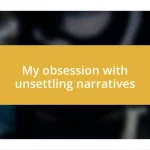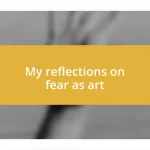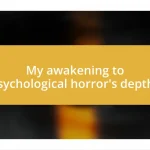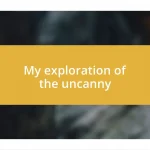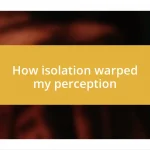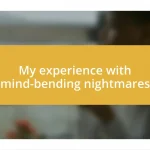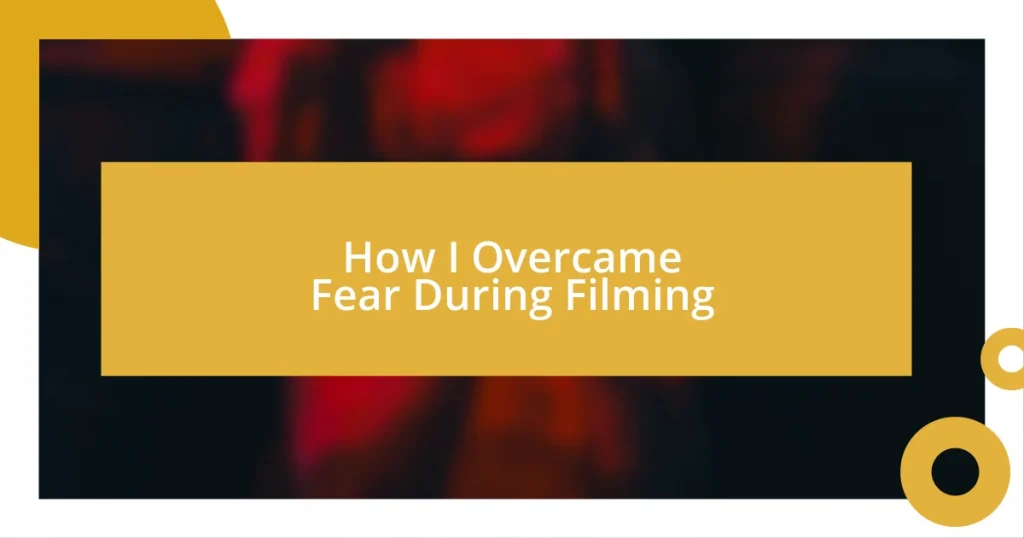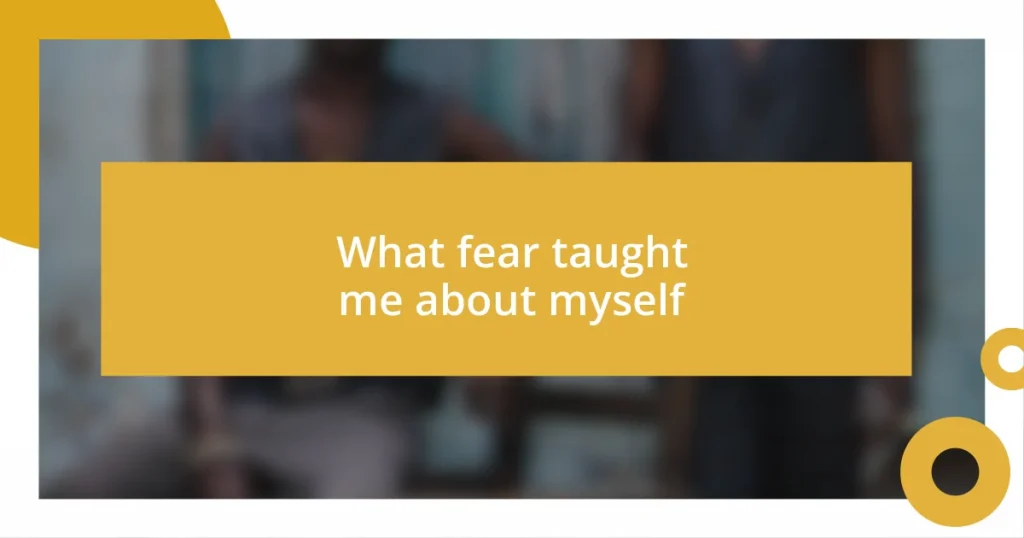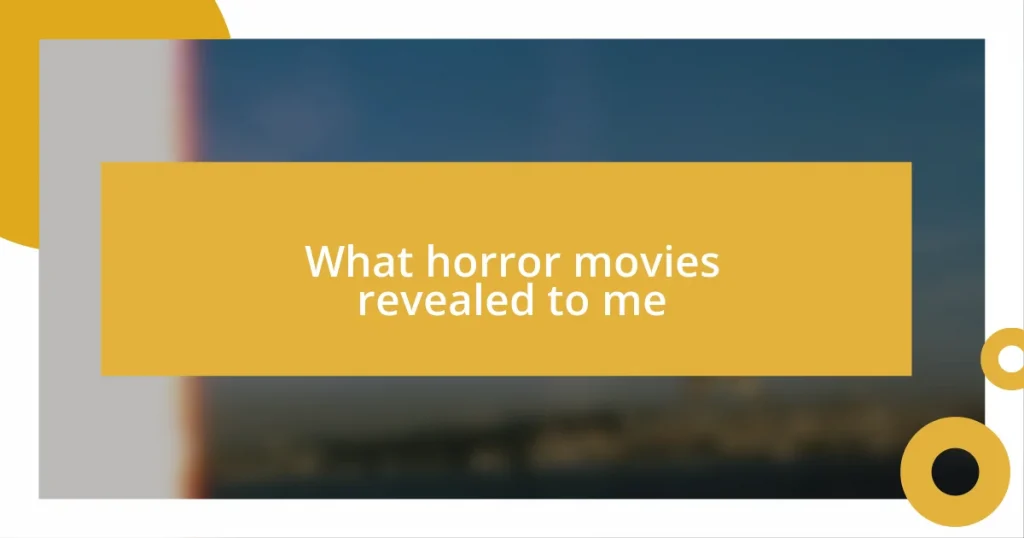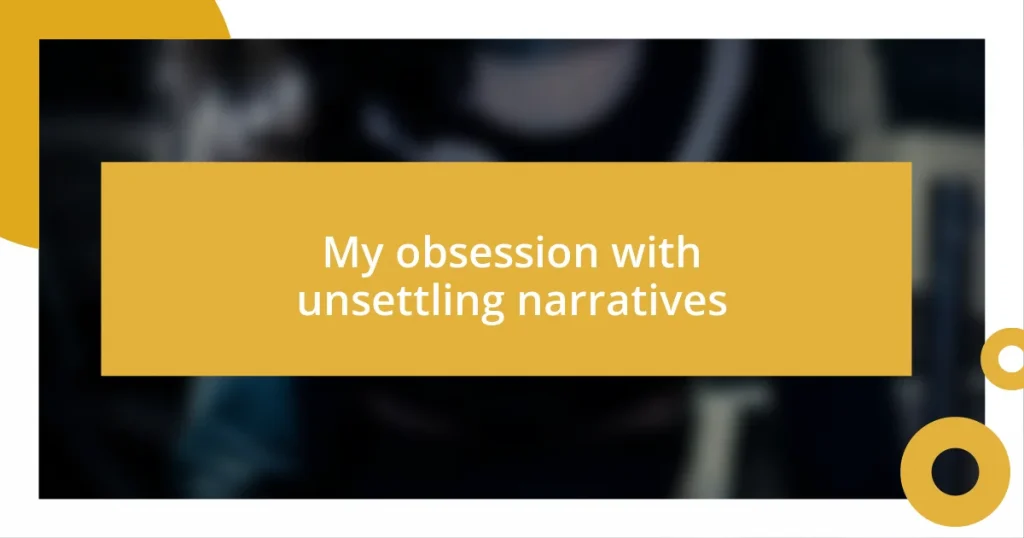Key takeaways:
- Fear can be redefined as a guide for personal growth rather than a barrier, encouraging individuals to embrace challenges in their craft.
- Establishing a pre-filming routine, including visualization and team discussions, significantly reduces anxiety and boosts confidence.
- Seeking constructive feedback and viewing mistakes as learning opportunities enhances performance and fosters confidence through experience.
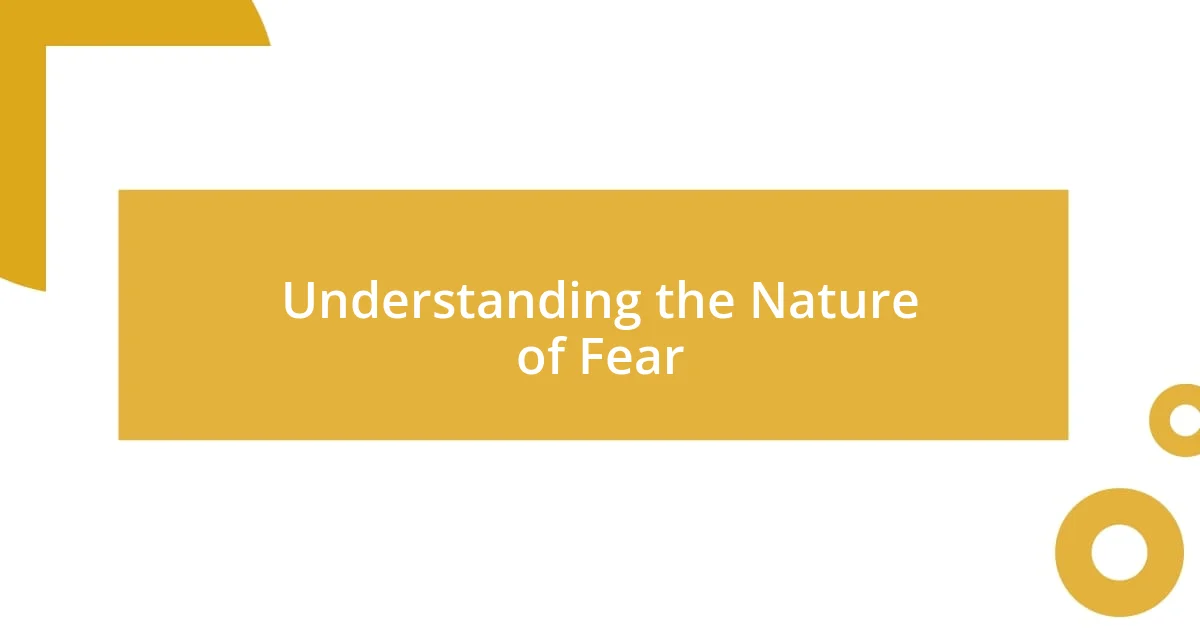
Understanding the Nature of Fear
Fear is an instinctive response that often operates in the background of our minds. I remember my first day on set; I felt the familiar knot of anxiety in my stomach as the camera began rolling. It made me wonder—why do we allow fear to tighten its grip on us when we’re pursuing something we love?
At its core, fear is a protective mechanism. It’s designed to alert us to potential dangers. However, in the context of filming, what I’ve learned is that this fear can become a barrier instead of a safeguard. I often found myself asking: What’s more frightening, the idea of failure or the thought of not pushing myself to grow?
Through my experiences, I’ve discovered that fear often stems from the unknown. The anticipation of the scene can be daunting, but each time I challenged that fear, I felt a surge of excitement—an exhilarating dance between dread and thrill. I’ve started to view fear not as an enemy, but as a guide that pushes me to explore new heights.
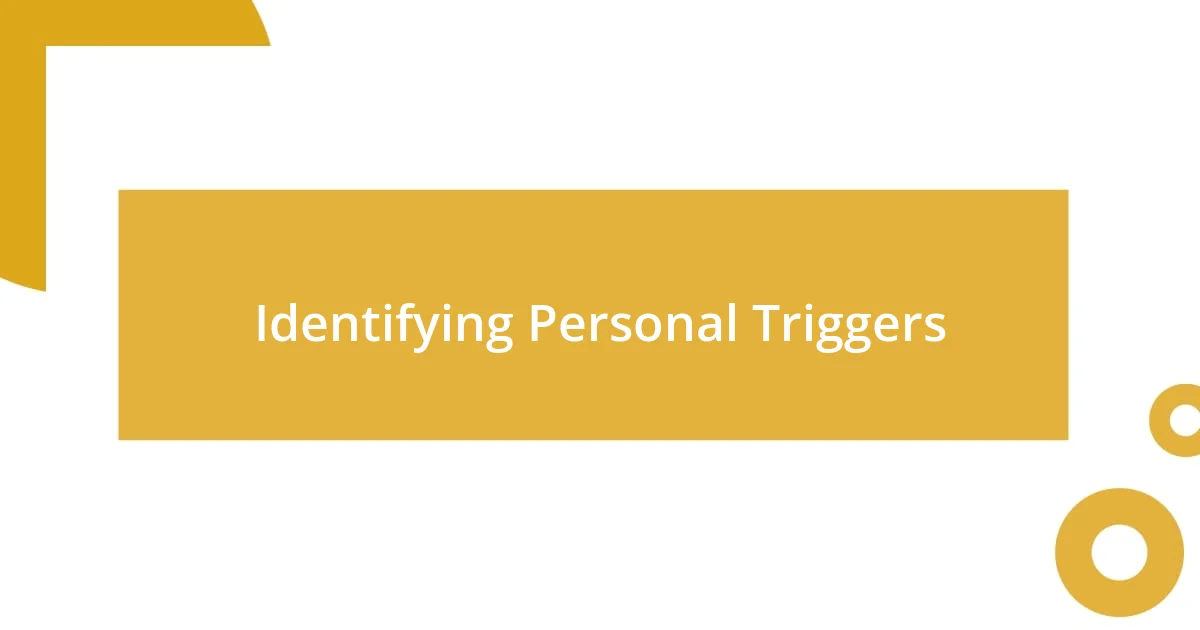
Identifying Personal Triggers
Identifying the specific triggers that provoke fear is crucial in overcoming those feelings. For me, it often surfaced during pivotal moments—like when I had to speak directly into the camera or when I found myself in a chaotic scene with many moving parts. I vividly remember the panic that gripped me when I heard the director call for my name. It took time for me to realize that this anxiety was tied to my desire for perfection and the fear of letting others down.
To effectively identify your personal triggers, consider these strategies:
- Reflect on Past Experiences: Think about situations where fear has overwhelmed you during filming. What specifically triggered that feeling?
- Keep a Journal: Write down your thoughts and feelings before and after filming. Patterns often emerge that reveal underlying fears.
- Seek Feedback: Discuss your experiences with trusted peers. They might identify triggers you hadn’t considered.
- Visualize Scenarios: Imagine different filming scenarios and the emotions they evoke. This visualization can help you pinpoint triggers.
By recognizing these nuances of fear, I learned to approach each filming day with newfound clarity, allowing me to tackle challenges head-on.

Developing a Pre-Filming Routine
Developing a pre-filming routine has been a game changer in my journey to overcome fear. When I started, I realized that having a structured approach before hitting the set significantly reduced my anxiety. I began incorporating simple rituals, like a brief warm-up or vocal exercises, which helped to center my thoughts and prepare me for the performance ahead. This calmness made a noticeable difference in my confidence levels.
One of my go-to practices is visualization; I’ll often picture each scene in my mind before we roll. It might sound a bit clichéd, but visualizing success rather than dwelling on potential pitfalls helped shift my mindset. There was a moment on set when I felt completely paralyzed by fear, but taking those few moments to breathe deeply and envision a seamless performance really grounded me. I could feel the worry fade away, replaced with eagerness to step into my character’s shoes.
Another valuable part of my routine includes a quick chat with a trusted teammate just before filming. Sharing my feelings and nerves allows me to voice my apprehensions and gain some perspective. I vividly recall one instance where expressing my worries led to a supportive exchange that lifted my spirits and gave me the confidence boost I desperately needed. It’s amazing how connecting with others can evoke a sense of community that eases the weight of fear.
| Routine Element | Description |
|---|---|
| Vocal Exercises | Warm-up my voice to relax and get in the zone. |
| Visualization | Picture each scene and my success to reduce anxiety. |
| Team Chats | Discussing worries with a teammate helps gain perspective. |
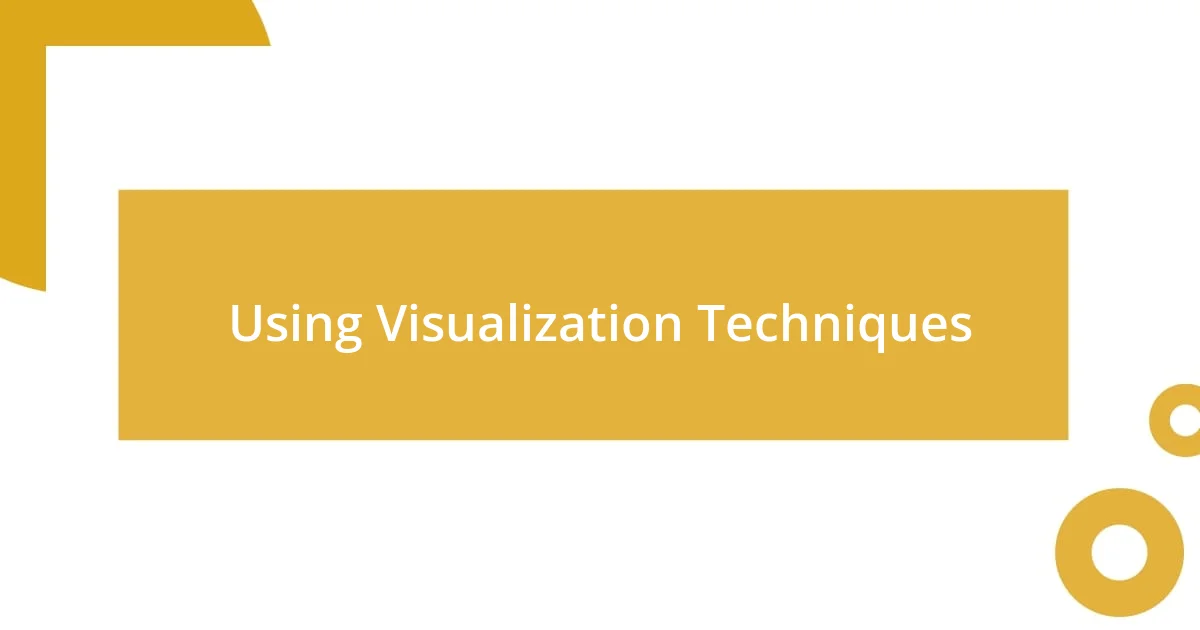
Using Visualization Techniques
Imagining the scenes in my mind before filming has become a powerful tool for me. I recall a time when I envisioned myself delivering a particularly challenging line. I felt the warmth of the lights, the weight of the camera, and most importantly, the sense of accomplishment that would wash over me after nailing it. By picturing myself succeeding, I could almost taste the joy that followed, which lifted a weight off my shoulders. Isn’t it fascinating how our minds can create such vivid experiences just through visualization?
There were instances, too, when I found myself stumbling through a scene, paralyzed by fear. During those moments, I would close my eyes and mentally rewind, replaying the scene where I saw myself shine. I would imagine the director’s nod of approval and the laughter of my fellow actors after a good take. This exercise wasn’t just about dreaming; it was about reshaping my experience. Have you ever tried visualizing success? It can transform anxiety into anticipation.
I also learned to incorporate the visualization process into my daily routine. Before I even arrived at the set, I would take quiet moments to sketch the overarching story in my mind—from the beginning to the climax. Once, standing off to the side during a hectic shoot, I took a breather and visualized everything falling into place perfectly. In that instant, I noticed my breath became steadier, and my nerves began to settle. The magic of visualization is real; it empowers you to rewrite your emotional narrative before a scene even begins.

Practicing Mindfulness Strategies
Mindfulness strategies have played a pivotal role in calming my nerves during filming. One technique that resonates deeply with me is focused breathing. I distinctly remember being backstage, heart racing and palms sweaty, just moments before a big scene. Taking a minute to inhale slowly and exhale gently shifted my focus from fear to clarity. It was as if my chaotic thoughts transformed into a gentle stream, allowing me to step onto the set with confidence. Have you ever tried focusing on your breath to regain your center? It can be surprisingly effective!
Another aspect of mindfulness that I embraced is grounding myself in the moment. I often find myself paying attention to the sensations around me: the coolness of the floor beneath my feet, the rhythm of my heartbeat, and even the hushed whispers of the crew prepping behind the camera. Reflecting on these simple details helps me reconnect with the present, pulling me away from the anxious thoughts of “what if.” Once, during a particularly tense shoot, I found solace in the vibrant colors of the set, which distracted me from my jitters. It’s remarkable how tuning into our immediate environment can redirect our focus.
I’ve also ventured into short meditation sessions before filming. Sitting in silence, I allowed my thoughts to drift and settle, much like leaves floating down a stream. One day, seriously panicking over a major scene, I decided to take a five-minute break for meditation. That short pause transformed my approach; I emerged not just calmer but also more connected to my character. It made me wonder, how often do we underestimate the power of stillness in a high-energy environment like set life? Embracing these mindful moments can genuinely be a game changer, enhancing both performance and peace of mind.

Seeking Constructive Feedback
Seeking feedback can sometimes feel daunting, especially in the creative world of filming. I remember one instance when I nervously approached my director after a scene. My heart raced as I asked for his thoughts. To my surprise, he not only praised what I did well, but also offered constructive suggestions. Instead of feeling discouraged, I realized that this feedback was a stepping stone to growth. When have you hesitated to seek feedback that could have helped you?
Sharing my work with fellow actors has also been a revealing experience. I’d often gather a small group for a post-take discussion, asking them to share their honest impressions. I vividly recall a time when I received a critique about my emotional delivery. At first, it stung, but reflecting on it later, I understood that they saw potential for me to dig deeper into the character’s backstory. It’s incredible how feedback from peers can illuminate paths we may overlook ourselves.
Most importantly, I’ve learned to cultivate a mindset that welcomes feedback rather than resents it. During a particularly nerve-wracking project, I opened a dialogue with a mentor who had been in the industry for years. Their insights not only heightened my understanding of my craft but also provided me with actionable steps to improve. It made me wonder, how different would my journey be if I had embraced feedback earlier? Understanding feedback as a tool for development has become a fundamental part of my creative process, one that I now cherish.
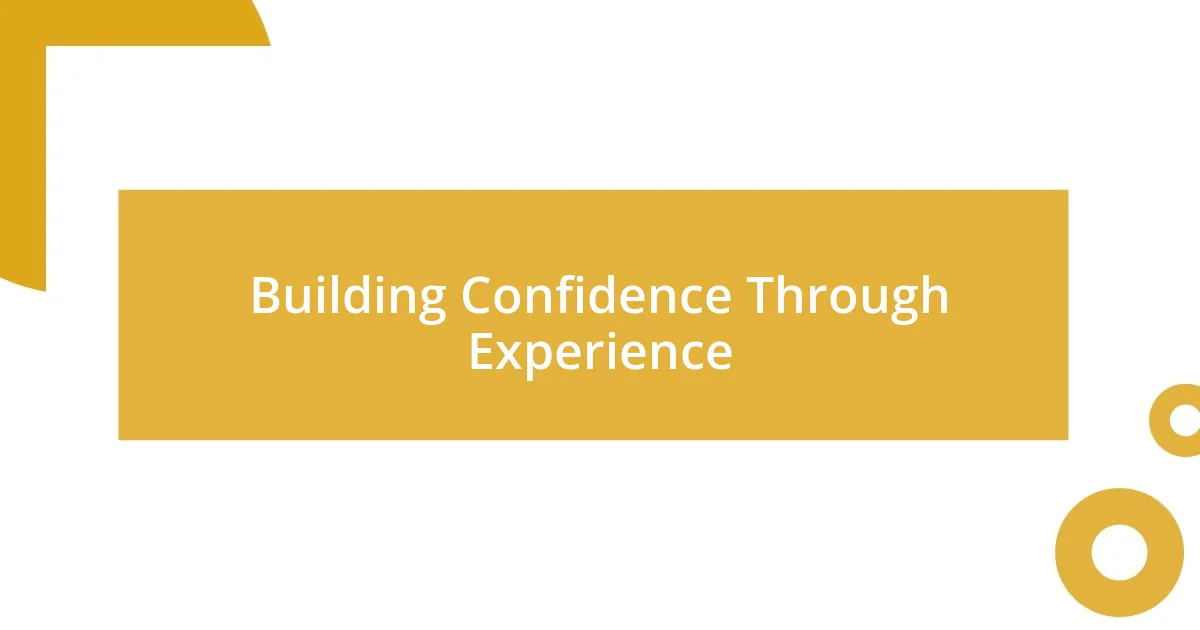
Building Confidence Through Experience
Building confidence through experience is something I’ve learned, often through my most challenging moments on set. I remember my first film shoot; the sheer terror I felt before the cameras started rolling was palpable. Strangely enough, after the first take—a shaky, awkward performance—I felt a surprising sense of relief wash over me. I realized that stepping into the performance, even if it wasn’t perfect, was the first step toward building that elusive confidence. How many of us allow perfectionism to stifle our early attempts, only to discover that trying is half the battle?
As I continued to film more projects, I used each role as an opportunity to push my comfort zone further. For instance, during a particularly intense dramatic scene, I felt a wave of fear wash over me, the kind that makes you question your ability. Instead of shying away, I leaned into the moment, allowing my vulnerability to inform my performance. The more I faced those fears, the more I realized that experience was my greatest ally; each shoot built upon the last, steadily reinforcing my confidence. Have you ever noticed how growth often comes from facing uncomfortable situations head-on?
Looking back, I see how each filming experience added layers to my confidence. There were days when I stumbled, missing cues or flubbing lines, but those moments were just as valuable as the victories. I recall a time I completely forgot my lines in the middle of a scene; embarrassing, right? Yet, I quickly adapted and improvised, which turned the mistake into a highlight of my character’s arc. Those experiences taught me that mistakes are not failures but stepping stones to deeper understanding and stronger performance. How powerful it is to realize that each challenge can transform into a teaching moment on my journey!
